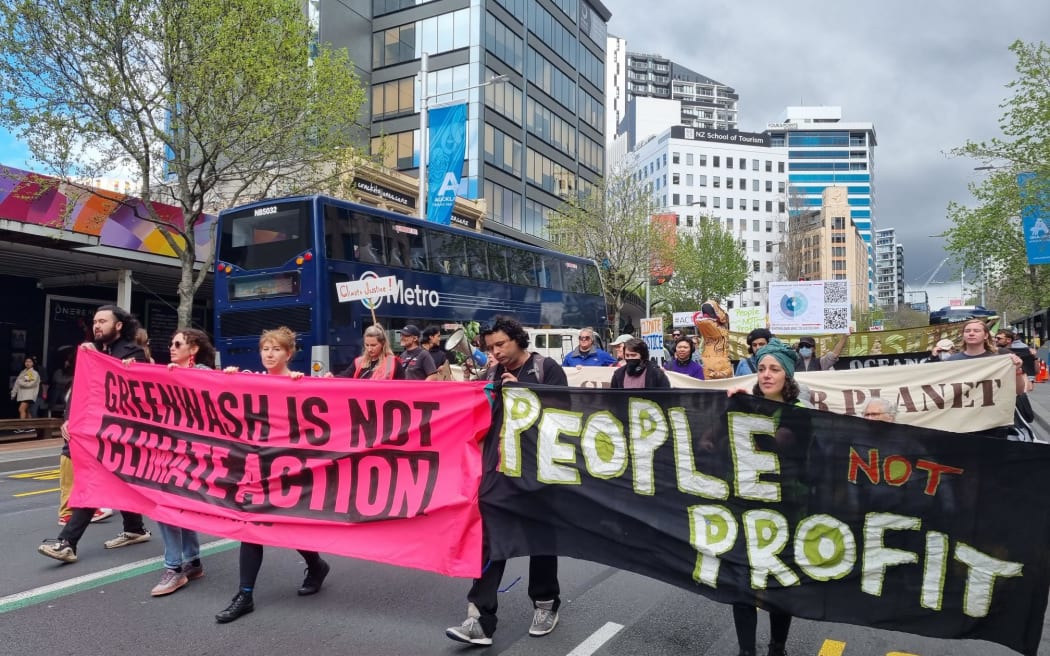Ahead of COP 27 in Egypt next month, The Detail does a stocktake of New Zealand's progress towards its zero carbon 2050 goal.

The Fridays for Future Tāmaki Makaurau march in Auckland on 23 September, 2022. Photo: RNZ / Felix Walton
News stories about the impact of climate change are almost always overwhelmingly negative: bush fires in Australia, heatwaves in the United Kingdom, record flooding in Pakistan.
Do we have any reason to feel optimistic that progress is being made towards reducing our carbon emissions and hitting the net zero 2050 goal?
Newsroom's business editor Nikki Mandow, who's just made a podcast series called Net Zero: The Road to 2050, thinks so - though she's not really sure why.
"It's pretty bizarre, because I'm looking at the whole overview of where we're at on this road to 2050 and I should be super pessimistic," she tells The Detail.
"We're already having hideous things happening to the planet and there's not a single country that's on track with what it's doing now for the [limiting global warming to] 1.5 degree goal.
"There are some which are nearly there - Costa Rica, Kenya and Ethiopia - [but] New Zealand is highly insufficient in what it's doing to try and get to its 1.5 degree goal."
At a conference last week, Mandow says she should have left feeling pretty negative. Instead, she left feeling upbeat.
"Practically everyone who's in the sector, when I ask them, 'why are you optimistic?' they went, 'I don't really know, but I am'.
"I think people looked at what we did with Covid and they went, 'we did it, with Covid', that's been a bit of an optimistic thing for people in the climate change arena."
Vincent Heeringa, host of The Climate Business podcast, says in the short term, he's really pessimistic.
"And it will get worse before it gets better, and the worse will be in weather, it'll be in disasters, it'll be in crop failures, it'll be in sea level rise.
"But in the long term I feel really optimistic and the reason for that I think is humans are remarkable - we're remarkably terrible, but we're remarkably great also. We've got fantastic survival instincts, we've got the ability to cooperate, and we've seen cooperation work before."
He says disasters like the 2019-2020 Australian bush fires have woken people up to the realities of climate change.
"What made the difference, it was the tragedy of those wildfires and the terrible images of burning wildlife...huge destruction of property and the knowledge that that's going to happen again. In some ways we're terribly slow learners and my personal opinion is that has to happen before we're jolted into making major change."
In the meantime though, there's plenty of negative news around about the world's inaction on climate change - and its consequences.
"We can't gild the lily, we are facing an existential crisis about the state of the way that we live...we're right to be worried, we're right to be concerned."
Despite all the doom and gloom, Heeringa insists people can make a difference. He points to the philosophy around regeneration.
"Climate change is overwhelming, it's so big it's disempowering, you see things happening in Paris [COP 21] and in Glasgow [COP 26] and you think, that's other people, big fancy people making decisions.
"Actually, the philosophy of regeneration says every act will build on itself and so the regenerative movement says, whatever you do, just try and leave the world a little better than what encountered it in the first place."
Find out how to listen and subscribe to The Detail here.
You can also stay up-to-date by liking us on Facebook or following us on Twitter.

Photo:


